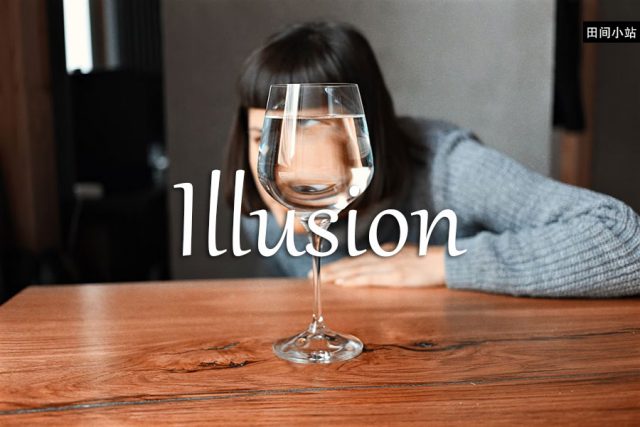本文经授权转载自微信公众号:田间小站

考研 CET6 IELTS TOEFL SAT TEM8
外刊例句
- In 1909, Norman Angell wrote a book called “The Great Illusion” which posited that war between nations would be futile because of their economic interdependence. Five years later, war broke out anyway.
1909年,诺曼·安吉尔在《大幻觉》一书中表示,国家之间的战争是徒劳的,因为它们的经济相互依赖。五年后,战争还是爆发了。
——《经济学人》 - Donald Trump has been impeached for trying to kill the results of our last election, but we should have no illusions that whatever happens at his trial, the weapon he used is still freely available for others to deploy.
唐纳德·特朗普因试图扼杀我们上次选举的结果,已经遭到了弹劾。但无论他的审判情况如何,对于他所使用的武器依然能随意供他人所用这件事,我们都不应心存幻想。
——《纽约时报》
基本释义
[noun] a thing that is or is likely to be wrongly perceived or interpreted by the senses
[名词] (可能)被感官错误感知或理解的事物
深入解读
同上个月小站推送的 delusion 一样, illusion 也曾在 好书推荐 | 一本让你暑假弯道超车的单词书 一文中出现过,并提到它容易与 allusion, elusion 等相混淆。
Illusion 一词源自拉丁语 illusionem (嘲笑、嘲弄、玩笑、讽刺),于14世纪中期经古法语 illusion (嘲笑、欺骗、欺诈)进入英语后,最初也是用来表示“欺骗”,不过这一含义现已不再流行。
等到了14世纪末后, illusion 开始发展出现在的主要含义,既可以指物理上的“错觉、幻象、假象”,即一种欺骗性的外观或外表,给人一种似是而非的错觉;也可以表示思维中的“幻想、错误的观念”。
与 delusion 有所不同的是, illusion 很少意味着精神错乱或无法区分真假,而是侧重指看起来似乎是真实的事物,特别是受自己的感觉或情绪影响而被眼睛、头脑等,对其实际性质产生错误感知或理解的客观事物,比如:
- 房间里放面大镜子能给人一种房间很宽敞的错觉。
A large mirror in a room can create the illusion of space. - 婚姻破裂带来的心理创伤使她对爱情的幻想破灭了。
The trauma of marriage breakdown shattered her illusions about love.
名著用例
She was eighteen years of age, bright, timid, and full of the illusions of ignorance and youth.
她才十八岁,聪明,胆怯,由于无知和年轻,充满着种种幻想。
出自美国现实主义作家西奥多·德莱赛(Theodore Dreiser)创作的长篇小说《嘉莉妹妹》(Sister Carrie)。参见:名著下载 | 嘉莉妹妹(Sister Carrie)
同近义词
- mirage: something that appears real or possible but is not in fact so
- hallucination: an experience involving the apparent perception of something not present
- delusion: a false belief or opinion about yourself or your situation